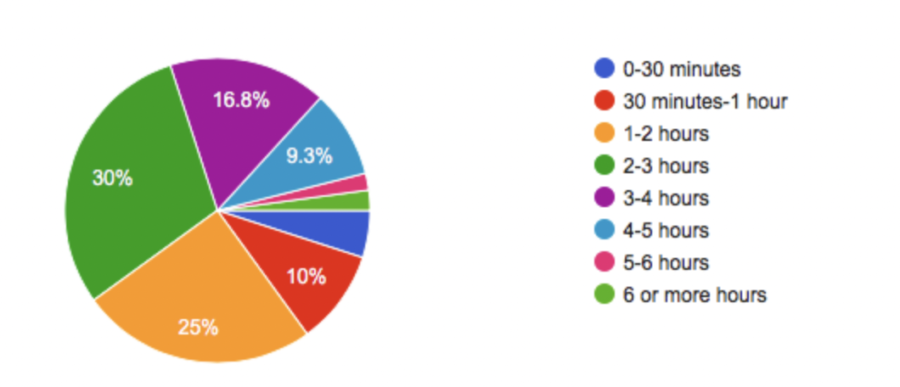Boulder High Students: Too Overwhelmed with Schoolwork?
Chart shows division of time spent doing schoolwork per night. The majority of Boulder High students have over 2 hours of schoolwork per night.
We have all had that experience: two tests the next day, an endless pile of math homework, vocabulary terms for language arts, and an extracurricular activity that takes up hours of the afternoon. Through that slog of studying, schoolwork and activities, these thoughts have probably popped into your head: “It’s not fair to have this much schoolwork” or “Do teachers know I have six other classes?” or “Do teachers expect me to study until 2 am?” So, how much schoolwork should a student have?
The Owl sent a survey to Boulder High students asking about how much school work they did per night. Over 280 Boulder High students responded to our survey, and we found the results quite interesting. Around 30% of Boulder High students said having 3+ hours of schoolwork each night, on average. This includes both homework and studying, but not extracurricular work like SAT or ACT preparation. Another 30% reported having 2-3 hours of schoolwork every night. The final 40% of students reported having 0-2 hours of schoolwork per night.
Our next set of questions were about the impact of schoolwork on the lives of students. 19.4% of Boulder High students reported having 10/10 amount of stress from schoolwork and 15.5% of Boulder High students reported that they have not been able to maintain relationships with people in their lives due to schoolwork.
When asked if teachers have unrealistic expectations for how much schoolwork students can get done, a majority of students believe that their teachers have unrealistic standards for the amount of work that students can, or should, do.
The majority of Boulder High students believe that teachers have unrealistic expectations of the amount of schoolwork their students can do.
A student should never be experiencing “unbearable stress,” “a no social life,” or “no sustainable relationships,” as a result of schoolwork. The fact, in some instances, that 20% of Boulder High’s student body is having these feelings is not acceptable. Teachers are conscious of this feeling, and they as well have increased stress in school this year. When I talked to Ms. Butler, an AP Calculus teacher, she said that she could notice an increase in pressure from years prior and noted that she, too, was feeling more stress as a result of the return of in-person learning. To mitigate this stress, she said that her class now has 2 review days before a test and she periodically sends out Google Surveys to check in on the mental health of her students.
So, what can be done? Malia Hanson, ‘22, said that teachers should give soft deadlines so that students could have more flexibility for when they do their work and Nathalie Pena, ‘22, thinks that teachers should hold tests to less of a standard so that they are less stressful.
One idea is to give more time for an assignment, not just assign the assignment one day and have it due the next day. This gives the student more autonomy in planning when they will do the assignment, and it avoids a situation where a student has tons of homework to do one night and no homework the next night. It also gives the student the ability to solicit help from their teacher, which avoids the student feeling immense stress to figure out the concepts that day. The teacher wouldn’t have to assign less homework, they would just give the student more time.
Another idea to decrease stress in students is to have opportunities to retake or re-do assignments. If on the day of the test something happened in the students’ personal life, irrespective of their knowledge of the subject, they could perform much worse. Stress itself is an extremely inhibiting factor for success on tests, and if the student goes into the test knowing that they could re-do the test if they don’t do well, this could decrease the stress and make the student perform better on the test.
Sarah Banks, ‘22, suggested teachers should give time in-class for students to do schoolwork. Monica Herrington, ‘22, suggested that teachers should limit the amount of “busy work” that they assign students because it doesn’t help out the students in their learning process. None of the students that we interviewed suggested that there should be less work or decrease the amount of content, they just think that there are practices that teachers could adopt that would decrease the stress of students.
Students and teachers should be able to have an open conversation to more effectively combat the issue of stress. After all, if there is no dialogue, then teachers don’t know when their students are stressed and students feel isolated in this feeling.

Charlie is an interested and passionate senior at Boulder High. This is his first year on the Owl staff and he is excited to learn about journalism and explore his passion for writing. He joined the Owl hoping to find a community of writers and journalists that shared similar interests and passions. Outside of school, you can find Charlie doing anything that involves the outdoors. Charlie is very interested in financial markets and economics, and he regularly writes about financial markets in his newsletter. He also likes to play all types of sports, whether it is dodgeball or nordic skiing. Fun fact: he once played a game of dodgeball with grapes. He played with red grapes because he would prefer...


